The Way of the Future Electric cars enjoyed a spate of popularity more than a hundred years ago, but the faster, cheaper, and better petrol-powered internal combustion machines squeezed them out. 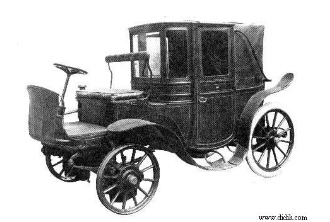 A 1903 Krieger, electric-petrol hybrid with power steering Now, as a result of high petrol prices and environmental cancers, the cars that run solely on electrical power, or a combination of electricity and petrol, the so-called hybrid cars, are being re-discovered. About thirty new models of electric or hybrid vehicles are set to hit the market worldwide during 2012 and the fist half of 2013. Just about everybody who’s anybody in the car industry (plus some who are not) has made or is getting ready to make a car propelled solely or partially by electricity: Nissan, Audi, BMW, Ford, Opel, Renault, Mitsubishi, etc. Some electric car advocates predict | | that the sales will rise steadily to claim 10% of the global new car market by 2020, and expect that in twenty years half of all new cars will be fully electric. Developing an electric vehicle is not a cheap undertaking and governments are helping with grants for the manufacturers and various subsidies and incentives for the consumers. Still, the uptake is slow and country after country is backing off ambitious targets. The biggest problems are: - The cost. All the incentives notwithstanding, electric cars are still too expensive. The majority of consumers are unwilling to pay more for an electric vehicle than they are currently paying for a comparable petrol powered car.*
- The radius. Most entirely electric cars have a range of 160 kilometres. Consumers would like that to increase to upwards of 450 kilometres.*
- The charge time. To be fully re-charged, the battery needs to be attached to an electricity outlet for three to six hours. A half an hour to two hour charging time seems to be acceptable to consumers.*
- The lack of infrastructure. Unsurprisingly, people are unwilling to buy an electric vehicle if there are no charging points where they live and work.
The good news is that progress is being made practically daily on all three fronts. The prices of electric vehicles are coming down; the driving range is improving; many cities in Europe, North America, Japan etc. are installing charging points. The change from internal combustion machines to electric vehicle is a big one and will probably take time. However, most experts agree that this sector is set for expansion, because there is really no alternative: there simply will not be enough liquid fuel left to satisfy the world’s ever-growing needs. That is why many are betting at 2013 (if not 2012) will be the year of the electric car. *The findings of a Deloitte online survey conducted among 13,000 consumers in 17 countries throughout the Americas, Asia, and Europe. |
| Some Electric Vehicles of Note | | | Nissan Leaf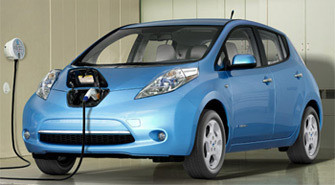 The best selling electric car to date, though the 25,000 units sold around the world since late 2010 is a very modest figure indeed. Nissan Leaf won the 2011 Car of the Year title and is car is set to be launched in South Africa in 2013, if the government provides incentives for the consumers and, of course, charging infrastructure. The prices vary from country to country, due to rebates some countries offer and other do not, and import duties some countries impose and others do not. In the USA, the Nissan Leaf base model will cost the consumer USD27,500 (about R230,000). The same model came to Australia at the end of June 2012 with the price tag of AUD51,500 (R430,000). | | | 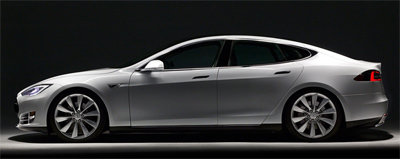 Tesla Model S Tesla Model S
The second step in Tesla’s long-term strategy to infiltrate the mass market bit by bit, from the top down. The company's first-born, Tesla Roadster, was a luxury electric vehicle made to bring glam into the world of the electricity propelled machines, which it largely succeeded in doing. The Model S pricing starts from USD57,400 (about R470,000) and goes up to USD77,400 (about R640,000). Tesla plans to make more than 5,000 Model S units this year and 20,000 in 2013. Orders currently exceed 10,000. | | | Renault ZOE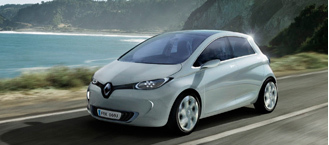 Also called a super-mini electric vehicle. According to its maker, Renault Zoe has set a new world record at beginning of June 2012: it travelled 1,618 kilometres in 24 hours, more than any other electric car. Fifteen drivers took turns driving it, and the vehicle was charged eighteen times. Zoe is scheduled for market launch in France later in 2012, with a very attractive price tag of about EUR15,700 (about R164,000). |
|
| The South African Joule | | EVs and Environment | Did you know that you can test-drive "made in SA" electric car? It is called Joule, an all-electric vehicle, and exactly three prototypes have been manufactured to date. The Joule has been in development since 2005 and the Department of Science and Technology has spent millions of Rands on it. However, in June 2012 came the news that the project has been shelved because the company behind the car, Optimal Energy, was unable to secure additional funding needed to turn the prototype into a mass-produced car. The original plan was to start production in 2014, with a sales target of 50,000 a year. It is believed that the biggest hurdle was the pricing. With the estimated retail price of R200,000, Joule stood no chance in competition with electric cars in its class. Optimal Energy says it will now focus is on electric buses for public transport. 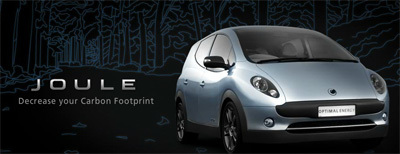
| | Protecting the environment has always been one of the main motives for going the all-electric vehicle way. However, the switch may merely mean moving the pollution from cities to generation sites. If the electricity needed to charge an electric car is produced by a coal or a gas fired power plant, the net carbon emissions are about the same as a the carbon emissions of a petrol vehicle. In order to be truly environmentally friendly, electric vehicles would need to use electricity generated from solar, wind or other clean sources. Until such lofty goal is achieved, moving the pollutants from densely populated cities to outlaying areas is still a bonus. Besides, it is easier to add carbon filters to a single power station than to hundreds of thousands of vehicles. So, with all limitations, electric vehicles are better for the environment than cars that run on fossil fuels and represent an important step toward reducing carbon emissions. 
|
|

